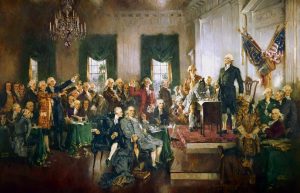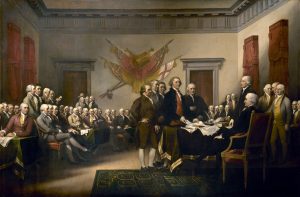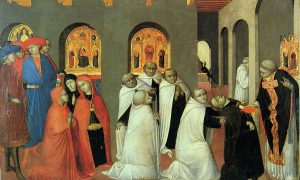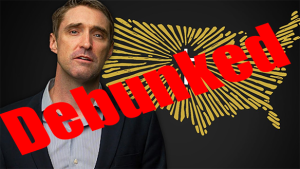“So the Lord said to Aaron, “You and your sons and your father’s house with you shall bear iniquity connected with the sanctuary, and you and your sons with you shall bear iniquity connected with your priesthood. And with you bring your brothers also, the tribe of Levi, the tribe of your father, that they may join you and minister to you while you and your sons with you are before the tent of the testimony.” – Numbers 18: 1-2 ESV
The separation of Church and State is a hot topic at the moment. The argument being that there was never meant to be a wall between the church and the government and keeping the two separated is unconstitutional. Whether or not the separation of Church and State is constitutional is a topic for another time. What I want to discuss today is this: Is the Separation of Church and State Biblical?
To answer this question, we must first look at the biblical Nation of Israel. In Israel , there are three positions of leadership to which men are appointed within the kingdom: King, Highpriest, and Prophet.
The prophets were the messengers of The Lord (Deuteronomy 18:13 – 22). Their role was to convey God’s will and word to the people. Chosen directly by God, a prophet can be anyone within the Nation of Israel, regardless of tribe. Being a prophet is also not mutually exclusive, many priests and kings were also Prophets of God.
Then there is the High Priest and the Levite priesthood. (Exodus 28:1-43) While the Prophets bring The Word of God to the People, The High Priest brings the praise and worship of the people to God. They are tasked with bringing offerings to God on behalf of the people so they may be forgiven of their sins. They are also called to maintain the holy places and oversee the peoples Worship of God as considered good and correct according to The Law.
Lastly, there is the king (Deuteronomy 17:14 – 20). The role of the king is to lead Israel’s armies and represent the kingdom in diplomatic and civil matters. He was to appoint officials, enforce the law, declare war, and do everything else you typically associate with a king.
Now the Priesthood was given authority to punish people who break the law in specific contexts. Being explicitly ordered to kill any non-priest who tries to enter the holy places (Numbers 18:7). At first glance this authority God gives to the priesthood seems to suggest the opposite of the separation of church and state. A closer look however reveals a relationship that is far more nuanced and has relevance even to those of us who live under the covenant of grace.
Civil Government
God actually gives very little direction or guidance as to the logistics or shape of the civil government in Israel. Even the position of King which God gives specific rules for, is actually a position of authority that the people of Israel must first choose.
“You may indeed set a king over you whom the Lord your God will choose. One from among your brothers you shall set as king over you. You may not put a foreigner over you, who is not your brother”. (Deuteronomy 17:14)
“You may indeed set a king over you” The position of King is an optional position. At first the people choose not to have a king. A period of four hundred years passed from the conquest of the promised land to the first king of Israel where the kingdom lacked a centralized civil leader. Instead being governed by the system of Judges. An organized civil leadership that was put together not by God or even one of God’s prophets. It is actually Moses’ father-in-law, Jethro, a God-fearing gentile, who organized the Judges under Moses (Exodus 18:13 – 27). We also see non-Jewish people serving in Israel’s civil government and military throughout scripture. Examples include Uriah the Hittite (2 Samuel 11:3), Ittai the Gittite (2 Samuel 15:19), the Kerethites and Pelethites (2 Samuel 8:18), and the Ishmaelites who served under Gideon (Judges 8:24).
We also see that while the priesthood does have authority, they are still very much under the authority of the king. David is referenced as having organized the priests and Levites into a stricter hierarchy (1 Chronicles 24), Saul actually has priests killed for defying his orders (1 Samuel 22:6 – 24:22), Solomon Banishes the High Priest Abiathar for supporting a rival to the throne (1 Kings 2:27), and Josiah deposes priests for unlawful worship practices (2 Kings 23:8-9).
The Priesthood
On that same note, while yes the priests had authority, it only applies in very specific contexts. The priests are specifically authorized to discipline and punish people when it is necessary to protect the holy places and to enforce proper worship. (Numbers 3:38) It is not as if they had the authority to create laws or wage war. So in regards to “The Church Leading the Government without Stepping on Religious freedoms” we need to remember:
- The priesthood may have had authority within the government but they were far from “leading” the government.
- The priesthood’s power was explicitly for the purpose of enforcing specific religious practices.
The authority the Priesthood was given also came with an increase in expectations. While scripture gives minimal guidance for civil leadership outside of the king, there are extensive rules given for all priests. To start with, the Priests must always be of the tribe of Levi (Deuteronomy 18:1). This means that a King can never become a high priest, as the King must always be from the tribe of Judah (Genesis 49:10). The tribe of Levi also has no inheritance of land in the promised land unlike the other tribes of Israel.
“The Lord is their Inheritance, as he promised them.” (Deuteronomy 18:2)
There are also many laws as to how priests must behave with the Laws surrounding the High Priest being even more restrictive. These laws are put in place to make it clear that they were separated from the rest of Israel’s people so that they may be made holy for God.
“For the Lord your God has chosen him out of all your tribes to stand and minister in the name of the Lord, him and his sons for all time.” (Deuteronomy 18:5)
“They shall be holy to their God and not profane the name of their God. For they offer the Lord’s food offerings, the bread of their God; therefore they shall be holy.” (Leviticus 21:6)
New Testament
But not to dwell upon ancient examples, let us come to the most recent spiritual heroes. We see this same language that is used when referring to priests is also used when referring to Christ’s Church.
“But you are a chosen race, a royal priesthood, a holy nation, a people for his own possession, that you may proclaim the excellencies of him who called you out of darkness into his marvelous light.” (1 Peter 2:9)
“Since we have these promises, beloved, let us cleanse ourselves from every defilement of body and spirit, bringing holiness to completion in the fear of God.” (2 Corinthians 7:1)
“Religion that is pure and undefiled before God the Father is this: to visit orphans and widows in their affliction, and to keep oneself unstained from the world.” (James 1:27)
Just as the Priesthood was commanded to set themselves apart so they may be kept holy. So too the Church must be set apart and kept holy.
While the Levitical priesthood and the Old Covenant have been done away with, (Hebrews 8:13) the positions of the Prophet, High Priest, and King have not only continued on but have been fulfilled and made holy. For they have been unified in Christ.
“If perfection could have been attained through the Levitical priesthood—and indeed the law given to the people established that priesthood—why was there still need for another priest to come, one in the order of Melchizedek, not in the order of Aaron? For when the priesthood is changed, the law must be changed also.” (Hebrews 7:11 – 12)
The book of Hebrews makes it clear that, in the eternal covenant, Christ is our King, our Great High Priest, and our Prophet. Unlike the levitical priests, Christ’s is not an earthly priesthood. For Christ is a priest that knew temptation but being without sin (Hebrews 4:14 – 15) passed through the heavens.
“For Christ did not enter a sanctuary made with human hands that was only a copy of the true one; he entered heaven itself, now to appear for us in God’s presence.” (Hebrews 9:24)
Scripture tells us that Christ our High Priest advocates on behalf not from an earthly holy place but a heavenly temple that is “within us” (1 Corinthians 3:16). Present everywhere God’s people gather in corporate worship. Christs Church is a Spiritual Temple of The Living God. Everywhere the Church gathers is Holy Ground, and God’s people worship him in spirit, unified across time, across space, and across the nations. For Christ tells us that “God is spirit, and those who worship him must worship in spirit and truth.” (John 4:24)
“What agreement has the temple of God with idols? For we are the temple of the living God; as God said, “I will make my dwelling among them and walk among them, and I will be their God, and they shall be my people.” (2 Corinthians 6:16)
What does this mean for us?
The separation of the church and state that we see discussed in the US Constitution is for the benefit of the people. But the separation we have in scripture is for the glorification of the Living God and so that His Church may be kept holy. For the spiritual temple of the living God is present wherever his people worship him.
This is why we separate church and state. So that the Great Assembly may be venerated and treated as Holy, and so that God may call our worship good. When we try to Place The Church in a position of earthly authority, we shackle ourselves to this earth and distract ourselves from the only thing that truly matters. Christian, do not burden Christ’s Church with responsibilities or labors other than those Christ has bestowed upon them.
“Do not be unequally yoked with unbelievers. For what partnership has righteousness with lawlessness? Or what fellowship has light with darkness?” (2 Corinthians 6:14)
Questions
- But Israel was still a theocracy? So shouldn’t we be trying to replicate it?
As said before, the old covenant has been done away with. God now commands us to worship differently than he once commanded the Israelites. Even if we ignore this fact, we do not have a Prophet, we are not Jewish, we do not live in the promised land, we have no tribe of priests, we have no holy places, no tabernacle. Any attempt to replicate Israel would be a mockery and a profane insult against God. (See Hebrews 5:11 – 14, Galatians 5:24, Acts 10:15)
- So you think Christians should separate themselves from the world and live in secluded communities like the Amish?
Not at all. The priests and the early Church lived among the people even as they separated themselves to be made holy. We are in this world, but we are not of it. The problem with Christian Nationalism is that it says the Church is so “of the world” as to make us Kings. The Church is called not to be Monarchs or Lions, but Sheep and Servants in the eternal Kingdom of the living God. (see John 17:14 – 16, Mark 9:35, Romans 6:18, Matthew 25:31-46)
Sources
Pengelly, Martin. “Republican Lauren Boebert Wins in Colorado after Denouncing Separation of Church and State.” The Guardian, Guardian News and Media, 29 June 2022, https://www.theguardian.com/us-news/2022/jun/29/republican-lauren-boebert-wins-colorado-primary-church-state
Winters, Micheal. “Speaker Mike Johnson’s Biblical Worldview Is a Bit Crimped | National Catholic Reporter.” National Catholic Reporter, www.ncronline.org/opinion/ncr-voices/speaker-mike-johnsons-biblical-worldview-bit-crimped Accessed 23 Aug. 2025.
“Letter to the Corinthians (Clement).” CHURCH FATHERS: Letter to the Corinthians (Clement), www.newadvent.org/fathers/1010.htm. Accessed 25 Aug. 2025.




One Response